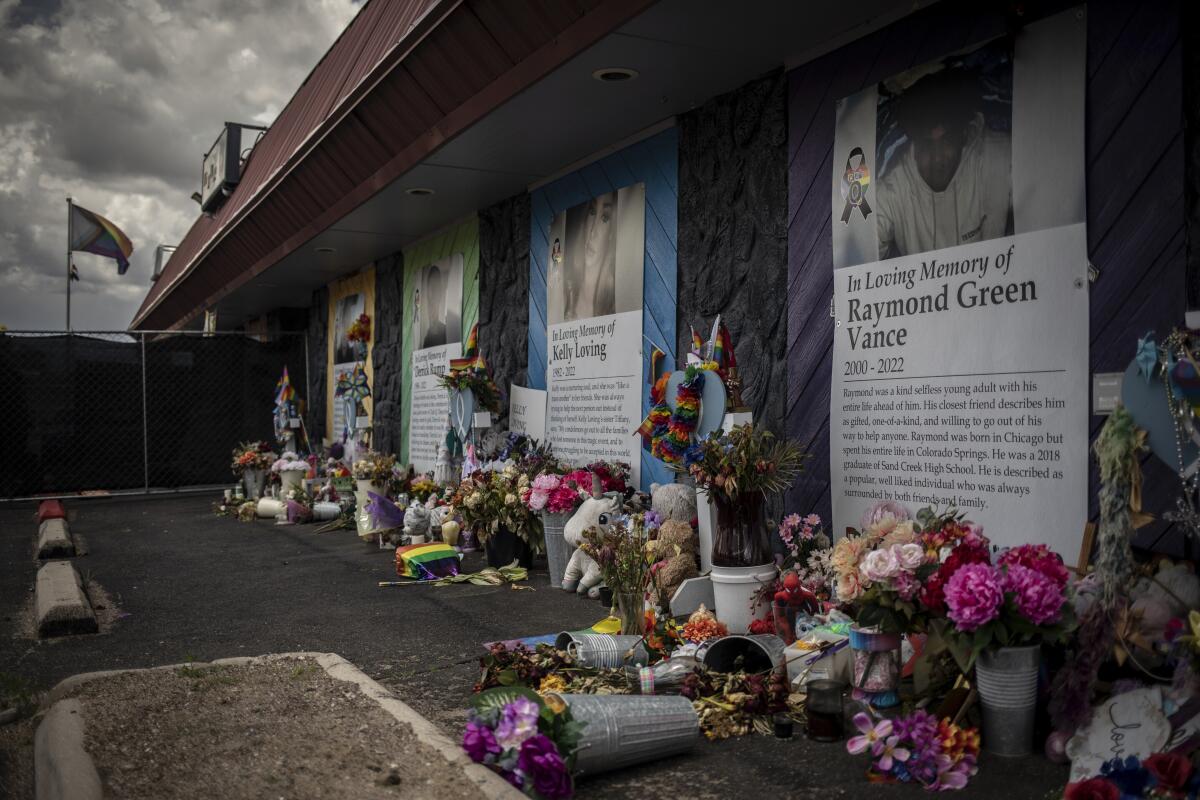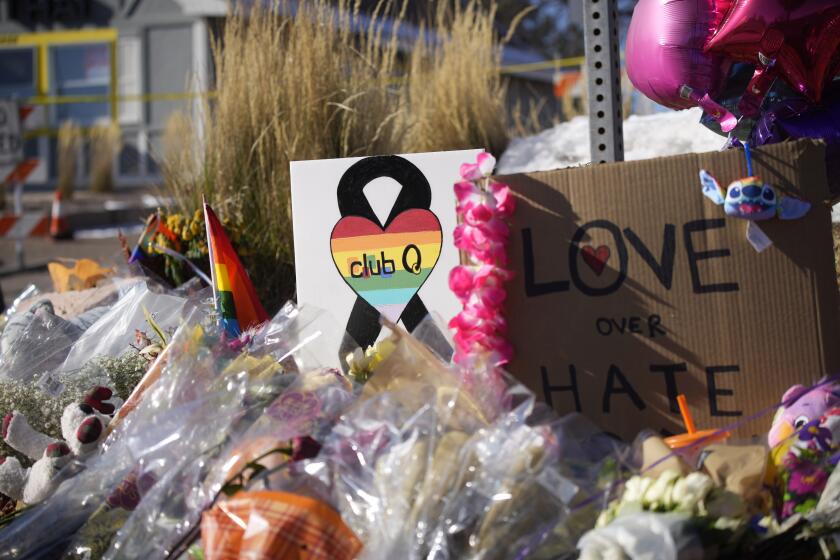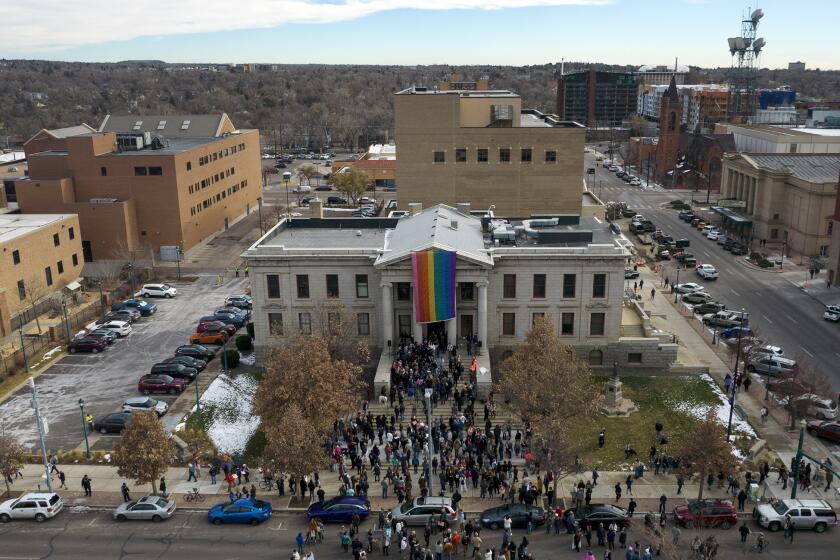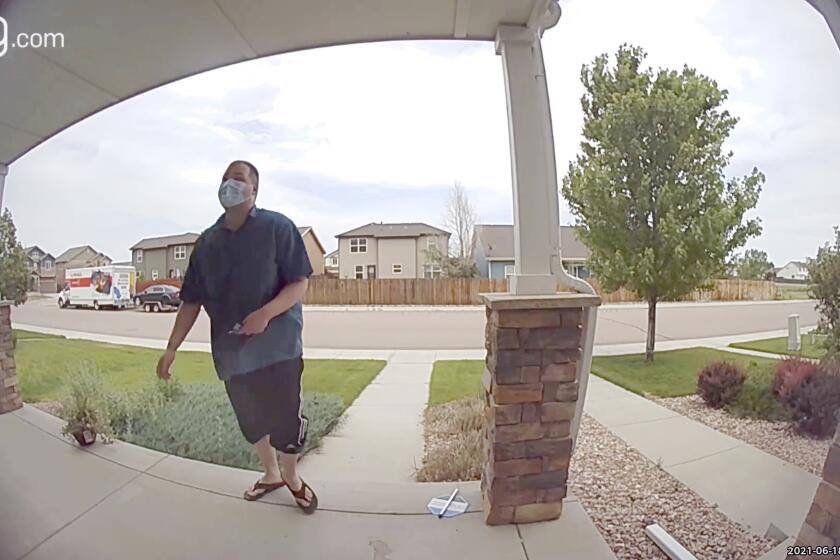Suspect in Colorado LGBTQ+ club mass shooting is expected to take plea deal

- Share via
COLORADO SPRINGS, Colo. — The suspect in last year’s mass shooting at a Colorado Springs gay nightclub, which killed five people and wounded 17, is expected to strike a plea deal to state murder and hate-crime charges that would ensure at least a life sentence, several survivors told the Associated Press.
Word of a possible legal resolution of last year’s Club Q massacre follows a series of jailhouse phone calls from the suspect to the AP expressing remorse and the intention to face the consequences at the next scheduled court hearing this month.
“I have to take responsibility for what happened,” 23-year-old Anderson Lee Aldrich said in their first public comments about the case. Aldrich uses “they”/”them” pronouns.
Federal and state authorities and defense attorneys declined to comment on a possible plea deal. But Colorado law requires victims to be notified of such deals, and several people who lost loved ones or were wounded in the attack told the AP that state prosecutors have given them advance word of Aldrich’s intention to plead guilty to charges that would ensure the maximum state sentence of life behind bars.
Prosecutors also recently asked survivors to prepare for the June 26 hearing by writing victim impact statements and steeling themselves emotionally for the possible release of the Club Q surveillance video of the attack.
“Someone’s gone that can never be brought back through the justice system,” said Wyatt Kent, who was celebrating his 23rd birthday at Club Q when Aldrich allegedly opened fire and gunned down Kent’s partner, Daniel Aston, who was working behind the bar. “We are all still missing a lot — a partner, a son, a daughter, a best friend.”
An investigation into the mass shooting is underway and a suspect has been arrested, but authorities have yet to identify a motive in the attack.
Jonathan Pullen, Aldrich’s step-grandfather, said Aldrich “has to realize what happened on that terrible night. It’s truly beginning to dawn on him.”
Aldrich faces more than 300 state counts, including murder and hate crimes. And the U.S. Justice Department is considering filing federal hate-crime charges, according to a senior law enforcement official familiar with the matter who spoke on condition of anonymity to discuss the ongoing case. It’s unclear whether the anticipated resolution to the state prosecution would also resolve the ongoing FBI investigation.
Some survivors who listened to Aldrich’s recorded comments to the AP lambasted the remarks as a calculated attempt to avoid the federal death penalty, noting that they stopped short of discussing a motive, put much of the blame on drugs and characterized the crime in passive generalities such as “I just can’t believe what happened” and “I wish I could turn back time.” Such statements, survivors said, were belied by the maps, diagrams, online rants and other evidence that showed months of plotting and premeditation.
“No one has sympathy for him,” said Michael Anderson, who was bartending at Club Q when the shooting broke out and ducked as several patrons were gunned down around him. “This community has to live with what happened, with collective trauma, with PTSD, trying to grieve the loss of our friends, to move past emotional wounds and move past what we heard, saw and smelled.”
A mass shooting at a popular gay club in Colorado Springs has many residents grappling with the city’s past as a center of anti-LGBTQ evangelical conservatism.
Terror erupted just before midnight on the night of Nov. 19, when an attacker walked into Club Q — a longtime sanctuary for the LGBTQ+ community in this mostly conservative city of 480,000 — and fired an AR-15-style semiautomatic rifle indiscriminately. Disbelief gave way to screaming and confusion as the music continued to play. Partygoers dove across a bloody dance floor for cover. Friends frantically tried to protect each other and plugged wounds with napkins.
The killing stopped only after a Navy petty officer grabbed the barrel of the attacker’s rifle, burning his hand because it was so hot. An Army veteran joined in to help subdue and beat the shooter until police arrived. The shooter had emptied one high-capacity magazine and was armed with several more.
Aldrich, who since their arrest has identified as nonbinary, allegedly visited Club Q at least six times in the years before the attack. Dist. Atty. Michael Allen told a judge that Aldrich’s mother made Aldrich go to the club “against his will and sort of forced that culture on him.”
Allen also has said that Aldrich administered a website that posted a “neo-Nazi white supremacist” shooting training video. Online gaming friends said Aldrich expressed hatred for the police, LGBTQ+ people and minorities, and used anti-Black and anti-gay slurs. And a police detective testified that Aldrich sent an online message with a photo of a rifle scope trained on a gay Pride parade.
A Colorado law allowing guns to be taken from people deemed dangerous has seldom been used, and was not in the case of the gay club shooting suspect.
Defense attorneys in previous hearings have not disputed Aldrich’s role in the shooting but have pushed back against allegations that it was motivated by hate, arguing that Aldrich was drugged up on cocaine and medication the night of the attack.
“I don’t know if this is common knowledge, but I was on a very large plethora of drugs,” Aldrich told the AP. “I had been up for days. I was abusing steroids. ... I’ve finally been able to get off that crap I was on.”
Asked whether the attack was motivated by hate, Aldrich said only that that’s “completely off base.”
Even a former friend of Aldrich found their remarks to be disingenuous. “I’m really glad he’s trying to take accountability, but it’s like the ‘why’ is being shoved under the rug,” said Xavier Kraus, who lived across the hall from Aldrich at a Colorado Springs apartment complex.
Breaking News
Get breaking news, investigations, analysis and more signature journalism from the Los Angeles Times in your inbox.
You may occasionally receive promotional content from the Los Angeles Times.
Former Club Q bartender Anderson is among survivors of the shooting who told prosecutors that they wanted a fast resolution of the criminal case.
“My fear is that if this takes years, that prevents the processing and moving on and finding peace beyond this case,” he said. “I would love this wrapped up as quickly as possible under the guarantee that justice is served.”
More to Read
Sign up for Essential California
The most important California stories and recommendations in your inbox every morning.
You may occasionally receive promotional content from the Los Angeles Times.
















